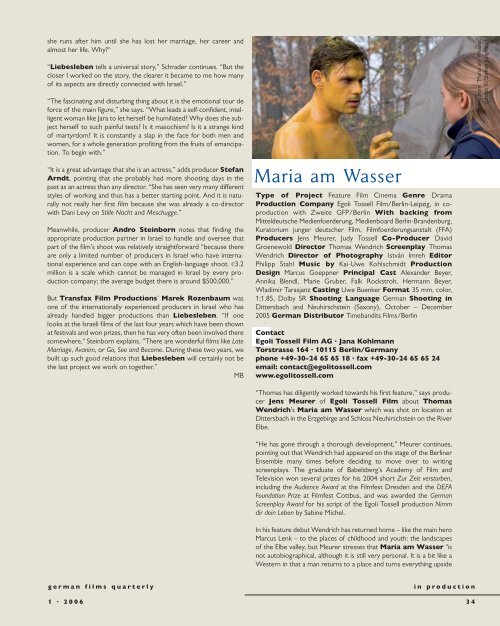GFQ 1-2006 - German Cinema
GFQ 1-2006 - German Cinema
GFQ 1-2006 - German Cinema
You also want an ePaper? Increase the reach of your titles
YUMPU automatically turns print PDFs into web optimized ePapers that Google loves.
she runs after him until she has lost her marriage, her career and<br />
almost her life. Why?“<br />
“Liebesleben tells a universal story,” Schrader continues. “But the<br />
closer I worked on the story, the clearer it became to me how many<br />
of its aspects are directly connected with Israel.”<br />
“The fascinating and disturbing thing about it is the emotional tour de<br />
force of the main figure,” she says. “What leads a self-confident, intelligent<br />
woman like Jara to let herself be humiliated? Why does she subject<br />
herself to such painful tests? Is it masochism? Is it a strange kind<br />
of martyrdom? It is constantly a slap in the face for both men and<br />
women, for a whole generation profiting from the fruits of emancipation.<br />
To begin with.”<br />
“It is a great advantage that she is an actress,” adds producer Stefan<br />
Arndt, pointing that she probably had more shooting days in the<br />
past as an actress than any director. “She has seen very many different<br />
styles of working and thus has a better starting point. And it is naturally<br />
not really her first film because she was already a co-director<br />
with Dani Levy on Stille Nacht and Meschugge.”<br />
Meanwhile, producer Andro Steinborn notes that finding the<br />
appropriate production partner in Israel to handle and oversee that<br />
part of the film’s shoot was relatively straightforward “because there<br />
are only a limited number of producers in Israel who have international<br />
experience and can cope with an English-language shoot. €3.2<br />
million is a scale which cannot be managed in Israel by every production<br />
company; the average budget there is around $500,000.”<br />
But Transfax Film Productions’ Marek Rozenbaum was<br />
one of the internationally experienced producers in Israel who has<br />
already handled bigger productions than Liebesleben. “If one<br />
looks at the Israeli films of the last four years which have been shown<br />
at festivals and won prizes, then he has very often been involved there<br />
somewhere," Steinborn explains. “There are wonderful films like Late<br />
Marriage, Avanim, or Go, See and Become. During these two years, we<br />
built up such good relations that Liebesleben will certainly not be<br />
the last project we work on together.”<br />
MB<br />
Maria am Wasser<br />
Type of Project Feature Film <strong>Cinema</strong> Genre Drama<br />
Production Company Egoli Tossell Film/Berlin-Leipzig, in coproduction<br />
with Zweite GFP/Berlin With backing from<br />
Mitteldeutsche Medienfoerderung, Medienboard Berlin-Brandenburg,<br />
Kuratorium junger deutscher Film, Filmfoerderungsanstalt (FFA)<br />
Producers Jens Meurer, Judy Tossell Co-Producer David<br />
Groenewold Director Thomas Wendrich Screenplay Thomas<br />
Wendrich Director of Photography István Imreh Editor<br />
Philipp Stahl Music by Kai-Uwe Kohlschmidt Production<br />
Design Marcus Goeppner Principal Cast Alexander Beyer,<br />
Annika Blendl, Marie Gruber, Falk Rockstroh, Hermann Beyer,<br />
Wladimir Tarasjanz Casting Uwe Buenker Format 35 mm, color,<br />
1:1.85, Dolby SR Shooting Language <strong>German</strong> Shooting in<br />
Dittersbach and Neuhirschstein (Saxony), October – December<br />
2005 <strong>German</strong> Distributor Timebandits Films/Berlin<br />
Contact<br />
Egoli Tossell Film AG · Jana Kohlmann<br />
Torstrasse 164 · 10115 Berlin/<strong>German</strong>y<br />
phone +49-30-24 65 65 18 · fax +49-30-24 65 65 24<br />
email: contact@egolitossell.com<br />
www.egolitossell.com<br />
“Thomas has diligently worked towards his first feature,” says producer<br />
Jens Meurer of Egoli Tossell Film about Thomas<br />
Wendrich’s Maria am Wasser which was shot on location at<br />
Dittersbach in the Erzgebirge and Schloss Neuhirschstein on the River<br />
Elbe.<br />
“He has gone through a thorough development,” Meurer continues,<br />
pointing out that Wendrich had appeared on the stage of the Berliner<br />
Ensemble many times before deciding to move over to writing<br />
screenplays. The graduate of Babelsberg’s Academy of Film and<br />
Television won several prizes for his 2004 short Zur Zeit verstorben,<br />
including the Audience Award at the Filmfest Dresden and the DEFA<br />
Foundation Prize at Filmfest Cottbus, and was awarded the <strong>German</strong><br />
Screenplay Award for his script of the Egoli Tossell production Nimm<br />
dir dein Leben by Sabine Michel.<br />
In his feature debut Wendrich has returned home – like the main hero<br />
Marcus Lenk – to the places of childhood and youth: the landscapes<br />
of the Elbe valley, but Meurer stresses that Maria am Wasser "is<br />
not autobiographical, although it is still very personal. It is a bit like a<br />
Western in that a man returns to a place and turns everything upside<br />
german films quarterly in production<br />
1 · <strong>2006</strong> 34<br />
Scene from “Maria am Wasser<br />
(photo © Steffen Junghans)
















